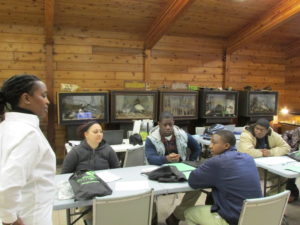The words “youth” and “environmentalist” don’t normally go together. But don’t tell that to the young people in the Atlanta Youth Corps.
Inside a classroom in Atlanta, a group of young Georgians are in training for an exciting new job that will also have the benefit of beautifying their neighborhood. Their first mission: Install gardens at fire stations around Atlanta.
The young people are being trained by the Greening Youth Foundation (GYF), an Atlanta-based nonprofit that has developed the nation’s leading conservation workforce development program working with youth from diverse backgrounds.
GYF has partnered with Atlanta City Councilman Kwanza Hall to develop the Atlanta Youth Corps (AYC), which is reaching into well-known Atlanta communities such as the Old Fourth Ward to recruit young people, ages 17 to 24. The corps is employing these young adults while providing them with literacy training and community service experiences as they learn to preserve and beautify their own neighborhoods.
Such training is nothing new for GYF. Since its founding five years ago, the nonprofit has trained and sent hundreds of minority youth across the United States to manage and preserve public lands and encourage environmental activism. The Grand Canyon and the Everglades National Historic Park are among the iconic federal sites where GYF crews have worked.
GYF will manage the pilot Atlanta Youth Corps program as part of Councilman Hall’s Year of Boulevard initiative, focused on Atlanta’s Boulevard street in the Midtown area. The cost of the public-private partnership will stem from the exact amount needed to complete a project. Each project will be designed in partnership with the City of Atlanta Parks and Recreation department and/or the community entity involved.
Corporations and private donors will be given an opportunity to participate in the corps by funding individual projects and joining the AYC members during the project as volunteers.
“I am thrilled that the Greening Youth Foundation has selected the Boulevard corridor for the pilot of the first-ever Atlanta Youth Corps,” said Councilman Hall.
The GYF partnership with the city of Atlanta comes as U.S. Secretary of the Interior Sally Jewell last month announced the formation of a new Civilian Conservation Corps to lure thousands of young people across the country into conservation work. Jewell made her announcement in front of Washington, DC’s Franklin Delano Roosevelt Memorial, which was an appropriate setting as she invoked the former president’s conservation corps that 80 years ago put 3 million young men to work building thousands of roads, planting a billion trees, and constructing hundreds of parks across the nation.
Jewell got a $1 million pledge from American Eagle Outfitters to begin work on what she called Civilian Conservation Corps 2.0, and she challenged the private sector to provide $20 million to fund the nonprofits that hire and deploy corps members.
With 350 parks, green spaces and community centers, the city of Atlanta is poised to benefit from the deployment of young people in a citywide conservation corps—particularly considering the city’s high unemployment rate for Black youth. Because of budget shortfalls and a growing population, the city has a difficult time maintaining all of its green spaces and rec centers.
“This program is a perfect culmination of what our organization is good at and what the City of Atlanta needs: workforce development for youth in the area of conservation and outsourced greenspace and park management,” Angelou Ezeilo, founder and CEO of Greening Youth Foundation, told ABS. “I am thrilled that GYF will be leading such an exciting initiative. Our team looks forward to working with the City of Atlanta to make this program an overwhelming success.”
GYF will deploy young people in crews of five, supervised by one team leader. They will be paid an hourly wage, in addition to performing community service volunteer hours each month. The crews will be recruited from communities such as Old Fourth Ward, West End and Inman Park, with the intent to have them work in their own and surrounding neighborhoods. They also potentially will be hired to conduct conservation projects on federal public lands.


